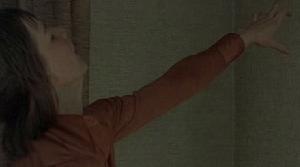
Requiem (Hans-Christian Schmid, 2006)
Hans-Christian Schmid's Requiem is the second film made based on the true story of Anneliese Michel, a student who died after an exorcism in Germany. The first one is The Exorcism of Emily Rose (Scott Derrickson, 2005), the horror film from last year which used the trial court proceedings against the exorcising priest as a frame to narrate the otherworldly events that transpired. Requiem is more simply told. It doesn't rely on flashy narrative techniques, or even special effects, but instead centers on the psychological complexity of the girl in question. Despite its austere filmmaking methods, Requiem remains to be more engaging than the creepy exorcism film.
Schmid films the events that transpire as it is. In fact, the notion that the film was based on the same true story that inspire The Exorcism of Emily Rose did not dawn on me until the middle, where the similarities start to surface. Almost documentary-like in his visual style, the film achieves an arresting sense of realism which separates it from the horror film that preceded it. Requiem's goal is certainly not to sensationalize the Catholic tradition of exorcism, or to put into scientific perspective demonic possession. Instead, Schmid becomes more interested in the psychological make-up of the personality who is possessed. Schmid is successful in burrowing through the possessed's history. In a way, the film serves as a convincing case study of possession: primarily pinpointing a specific familial structure and devout Catholic upbringing as root causes for the girl's psychological demise.
In the middle of the film's success is Sandra Hüller who takes on the role of Michaela Klinger, the education student who suffers bouts of epilepsy, hears imaginary voices, and finally implodes into a psychiatric mess. Her performance is not at all showy and does not attribute to typical and cliche ideas of possession. Whenever she twists and turns in pain, there is nothing supernatural about it. Whenever she starts addressing religious symbols or disrespects her mother, it all feels very natural and well-deserved. With the help of Schmid's careful and meticulously objective direction, and her other co-actors and actresses, Hüller completes a picture of the woman which the filmmakers in The Exorcism of Emily Rose merely touched the surface on.
Schmid resists every bit of temptation to turn Requiem into anything like The Exorcism of Emily Rose. Catholic symbols and ceremonies (Michaela idolizes a saint, up to the end) are a constant visual sight in the film, but that is the closest Schmid does to sensationalize Catholic belief. The Catholic imagery is merely one of the many facets that constitute the complexity of Michaela's person. Other facets include Michaela's closeness to her father and cold distance to her mother, her overly trusting nature, and many more. In the end, Schmid makes the more fascinating film with probably less than half of the budget. Requiem however is not merely good compared to the American horror film. It is a good film, period. It features an impressive performance from the female lead, and equally impressive performances from the supporting cast. Schmid's filmmaking (the other Schmid film I saw Distant Lights (2003) is an equally interesting take on immigration) is consistent throughout the entire film, and doesn't try to achieve more than what he intends to do.
0 comments:
Post a Comment